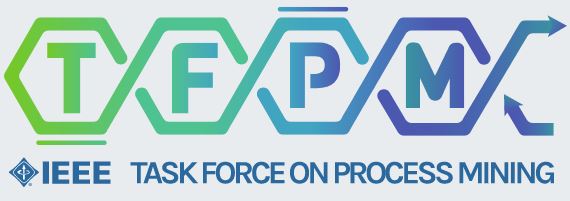- EdbA'21 -
Second International Workshop on Event Data and
Behavioral Analytics
Eindhoven, the Netherlands, 1 November 2021
Co-located at ICPM 2021

An activity from the IEEE Task Force on Process Mining
Over the past decades, capturing, storing and analyzing event data has gained attention in various domains such as process mining, clickstream analytics, IoT analytics, e-commerce and retail analytics, online gaming analytics, security analytics, website traffic analytics and preventive maintenance, smart homes and offices, just to name a few. It even resulted in the birth of new research domains such as behavioral informatics, behavioral analytics and behavioral operations research. The interest in event data lies in its analytical potential as it captures the dynamic behavior of people, objects and/or systems at a fine-grained level.
While each of these domains have their own applications and idiosyncrasies, they share the common denominator of event data and the objective to analyze behavior. Yet, these domains also differ in underlying assumptions and techniques used. Therefore, the objective of this workshop is to provide a forum to practitioners and researchers for studying a quintessential, minimal notion of events as the common denominator for records of discrete behavior in all its forms, and to study, develop and discuss techniques and methods for behavioral analytics based on all kinds of events.
The Event Data & Behavioral Analytics (EdbA) workshop considers as its starting point the presence of event data being recorded at various sources and contexts, being stored in various forms, and being considered for analysis of behavior of various kinds. Event data at different levels of granularity are considered, ranging from frequent sensor-based events in IoT settings to recordings of aggregate or long-running behavior involving time intervals and rich information. Behavior often involves multiple entities, objects, and actors to which events can be correlated in various ways. In these situations, a unique explicit process notion does either not exist, is unclear or different processes or dynamics could be recorded in the same dataset.
The workshop aims to further the development of new (or the novel application of existing) techniques, algorithms and data structures for recording, storing, managing, processing, analyzing, and visualizing event data in various forms. The workshop welcomes two types of submissions, i.e. original research papers as well as case study reports on event data and behavioral analytics.
The topics considered in the workshop consist of, but are not limited to:
- Augmentation of fine-grained event data to higher order activities or behavior
- Storage, integration, and querying of behavioral event data
- Representation and analysis of event data without a unique case identifier (without case identifier or with multiple case identifiers present)
- Monitoring and detection of complex behavior
- Diagnosis of behavior, including root-cause analysis, variance analysis, cluster analysis and many other exploratory analysis techniques
- Visual analytics of (complex) behavior
- Behavior Pattern detection, e.g., in real-time location data or other types of context-rich data
- Outlier Behavior Detection
- Behavior Prediction
- Prescriptive analytics which predicts behavior and prescribes which action could steer behavior in a specific direction
- Daniel Schuster, Lukas Schade, Sebastiaan J. van Zelst and Wil van der Aalst. Visualizing Trace Variants from Partially Ordered Event Data.
- Greg Van Houdt, Benoît Depaire and Niels Martin. Root Cause Analysis in Process Mining with Probabilistic Temporal Logic.
- Viki Peeva, Lisa Luise Mannel and Wil van der Aalst. Local Process Model Discovery by Combining Places.
- Marco Pegoraro, Bianka Bakullari, Merih Seran Uysal and Wil van der Aalst. Probability Estimation of Uncertain Process Trace Realizations
- Adam Banham, Sander Leemans, Moe Wynn and Robert Andrews. xPM: A Framework for Process Mining with Exogenous Data.
- Tobias Brockhoff, Merih Seran Uysal, Isabelle Terrier, Heiko Göhner and Wil van der Aalst. Analyzing Multi-level BOM-structured Event Data.
- Best Paper Award
- Discussion on open problems, issues and trends in event data and behavioral analytics
All accepted papers are published by Springer in the Lecture Notes in Business Information Processing (LNBIP) series.
Organizing Committee
- Depaire Benoît, Hasselt University, Belgium
- Fahland, Dirk, Eindhoven University of Technology, the Netherlands
- Leotta, Francesco, Sapienza University of Rome, Italy
- Senderovich, Arik, University of Toronto, Canada
Program Committee
- Piriklis Andritsos, University of Toronto, Canada
- Gaël Bernard, University of Toronto, Canada
- Ioannis Chatzigiannakis, Sapienza University of Rome, Italy
- Massimiliano de Leoni, University of Padua, Italy
- Jochen De Weerdt, Katholieke Universiteit Leuven, Belgium
- Claudio Di Ciccio, Sapienza University of Rome, Italy
- Chiara Di Francescomarino, Fondazione Bruno Kessler-IRST, Italy
- Bettina Fazzinga, DICES, University of Calabria, Italy
- Marwan Hassani, Eindhoven University of Technology, the Netherlands
- Gert Janssenswillen, Hasselt University, Belgium
- Xixi Lu, Utrecht University, the Netherlands
- Fabrizio Maria Maggi, Free University of Bozen-Bolzano, Italy
- Felix Mannhardt, Eindhoven University of Technology, the Netherlands
- Niels Martin, Hasselt University, Belgium
- Jan Mendling, Humboldt-Universität zu Berlin, Germany
- Marco Montali, KRDB Research Centre, Free University of Bozen-Bolzano, Italy
- Jorge Munoz-Gama, Pontificia Universidad Católica de Chile, Chile
- Matthias Weidlich, Humboldt-Universität zu Berlin, Germany